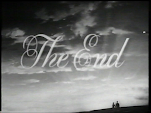
I am happy to be able to provide a link to a downloadable version of my first published piece on the Hollywood 'happy ending' - the subject which was the focus of my doctoral thesis. This essay, the opening chapter of an edited collection called Happy Endings and Films, offers an account of the invariably negative critical reputation that the 'happy ending' has acquired in film studies, arguing for the need to interrogate this reputation. Along the way we touch on David Bordwell, 'Screen theory', the 'self-consciously artificial' happy ending, and Sirk's Written on the Wind (1956).
A brief extract:
"We tend to assume we understand the ‘happy ending’ of Hollywood cinema – both that it exists, and what it is. This essay will question that assumption. [...] Although the term is used again and again in discussions of Hollywood, it is startling to realise that the cinematic ‘happy ending’ has received barely any sustained critical attention, nor has an adequate definition of it ever been agreed upon. [...] It is my belief that most film studies discussions of the ‘happy ending’ reflect less a wish to meaningfully discuss the feature than a widely-discernable desire to construct it as a critical ‘bad object’."
Many thanks to the editors for giving me permission to reprint the piece online.
MacDowell, James. 'Does the Hollywood Happy Ending Exist?' Happy Endings and Films. Eds. Armelle Parey, Isabelle Roblin & Dominque Sipière. Paris: Michel Houdiard, 2010. 15-27.
.

No comments:
Post a Comment